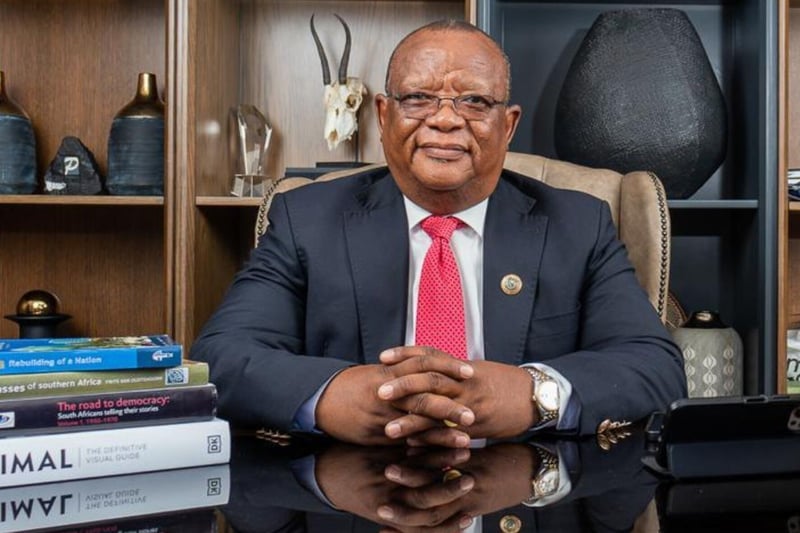Traditional Leadership in South Africa - A Vision for 2025 and Beyond
Written by: by Kgosi Nyalala Pilane, Chief of the Bakgatla Tribe in Northwest Save to Instapaper
By Kgosi Nyalala Pilane, Chief of the Bakgatla Tribe in Northwest
Over a hundred years ago, my ancestors settled our people, the Bakgatla-ba-Kgafela, at Mmasobudule on the Elands River, in what is today known as the Pilanesberg. This land, rich in platinum and potential, stands as a testament to the enduring resilience and vision of traditional communities.
The Role of Traditional Leadership
Traditional leaders in South Africa are custodians of cultural traditions and practices, but their role extends beyond the past. They must bridge the gap between history and the future, embracing innovative thinking and socio-economic transformation to uplift every individual within their communities. For too long, the contributions of traditional communities have been overshadowed by the focus on urban centres, perpetuating ignorance, educational disparities, and socio-economic exclusion.
Education: A Foundation for Progress
Addressing the challenges of education is a moral imperative for traditional leaders. In rural areas, education often lacks resources and attention, leaving children behind. Leaders must foster access to technology and introduce digital literacy programs to prepare youth for the future. This effort must also tackle socio-economic barriers, such as:
- Gender inequality: Initiatives like menstrual health support and safe transportation to schools.
- Youth empowerment: Equipping the younger generation with tools to compete on equal footing with urban counterparts.
Empowering Local Economies
For adults in rural communities, access to meaningful employment is critical. Infrastructure development, including reliable roads, clean water, and electricity, forms the backbone of thriving economies. Partnerships with government, private sector, and civil society are essential to attract investment and stimulate local businesses. Traditional leaders must champion a spirit of entrepreneurship, identifying and nurturing local talent to enable individuals to provide for their families with dignity.
Healthcare: A Pillar of Community Well-Being
Good health is foundational to pursuing any goal. Healthcare programs in rural areas must address limited access to clinics, medicines, and professionals. Efforts should also focus on:
- De-stigmatising mental health challenges.
- Expanding support for those in need of medical assistance.
Evolving Leadership for a Changing World
As we look toward 2025 and beyond, traditional leadership must evolve to meet the demands of a rapidly changing world while embracing cultural roots. This involves:
- Challenging outdated practices and replacing them with forward-thinking solutions.
- Ensuring inclusivity for all, including the elderly, women, youth, and people with disabilities.
Traditional leadership is more than titles and ceremonies; it is about responsibility, humility, courage, and vision. Every village should become a beacon of opportunity, every family should live in dignity, and every child should dream without limits.
Press Release Submitted By
Name: Kgosi Nyalala PilaneTitle: Chief of the Bakgatla TribeLocation: Northwest Province, South Africa
Social Media Post
A Vision for Traditional Leadership in 2025
Kgosi Nyalala Pilane calls for transformative leadership to empower rural communities through education, healthcare, and entrepreneurship. #TraditionalLeadership #RuralEmpowerment #KgosiPilane #Vision2025 #mypressportal #pressrelease #AfricaNewsroom #bizcommunity #publicrelations #africa #southernafrica #southafrica
Total Words: 589
Get new press articles by email
Latest from
- South Africa Needs Action on GBV, Not More Conversations — And It Must Start in Communities
- ORT Jet - Two Decades of Transformation – Celebrating the Power of Mentorship to Build Dreams and Futures
- Disability Exclusion Costs SA Billions in GDP as Corporates Struggle to Know Where to Start
- Afrika Tikkun Responds To R2.5 Billion Youth Fund Announcement – Capital Commitment Welcome But Distribution Reform Critical
- Standard Bank Pledges R750 Million (USD43.1m) in New GX Capital's Airnergize Platform
- From California to South Africa - Lessons for Our Advertising Future
- Where Training Ends and Insight Begins - Academic Thinking in Action
- From Boardroom to Classroom - Why Senior Leaders Are Going Back to School
- Calendar Activism Won't Build Inclusive Companies
- More Than Skin Deep - The Real Health Benefits of Oral Collagen
- The Green And Gardening Generation – ‘Plant Parenting’ Is South Africa’s New Obsession
- The Shape of Hunger Has Changed - South Africa's Evolving Nutrition Crisis Demands a New Response
- Out of the Book - Celebrating the Wonderful World of Imagination
- D&D Concierge Consulting hosts the 15th Annual Johannesburg Concierge and Guest Relations Conference at Victoria Yards
- Servest collaborates with the Gauteng Cricket Board “Lions Cricket”, to support grassroots and underprivileged talent
The Pulse Latest Articles
- Education Is The Frontline Of Inequality, Business Must Show Up (December 11, 2025)
- When The Purple Profile Pictures Fade, The Real Work Begins (December 11, 2025)
- Dear Santa, Please Skip The Socks This Year (December 10, 2025)
- Brandtech+ Has 100 Global Creative Roles For South African Talent (December 9, 2025)
- The Woman Behind Bertie: Michelle’s Journey To Cape Town’s Beloved Mobile Café (December 9, 2025)
